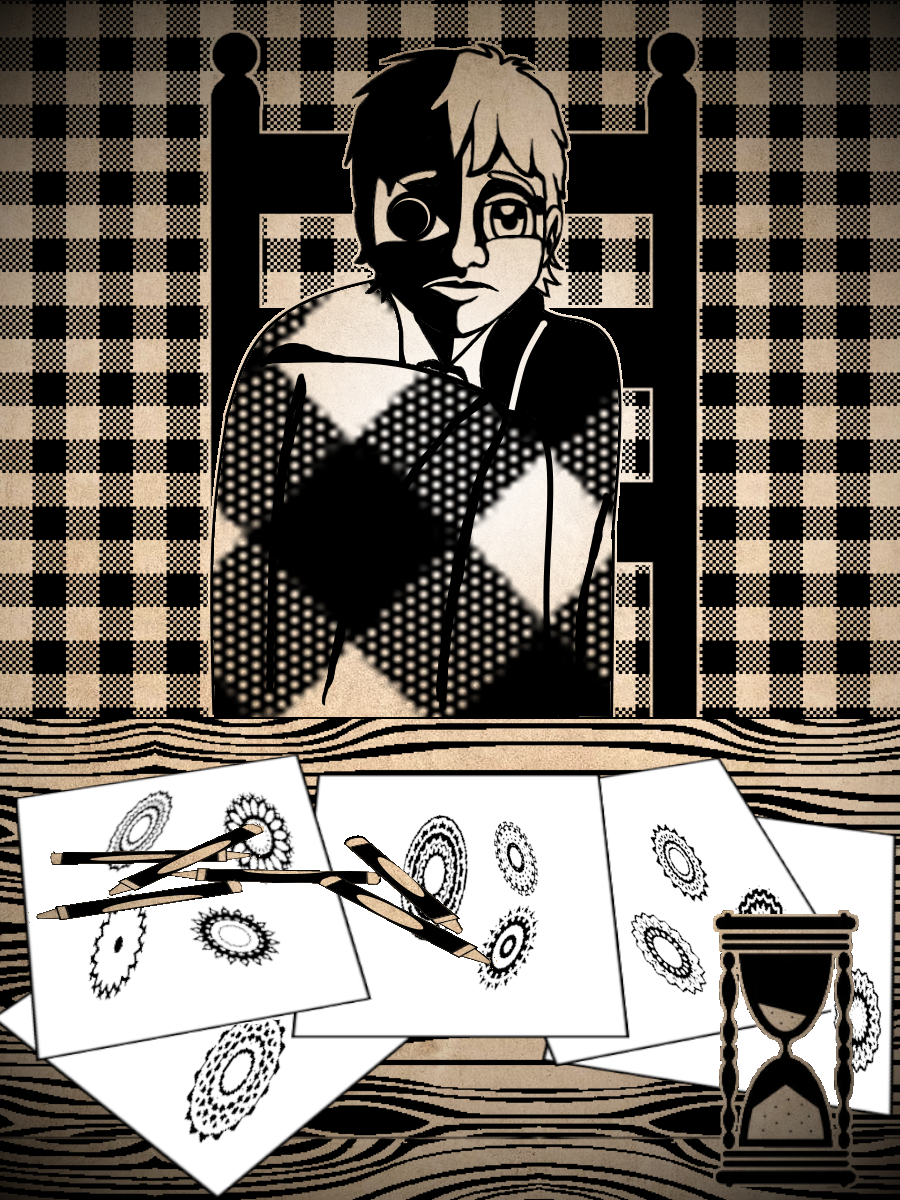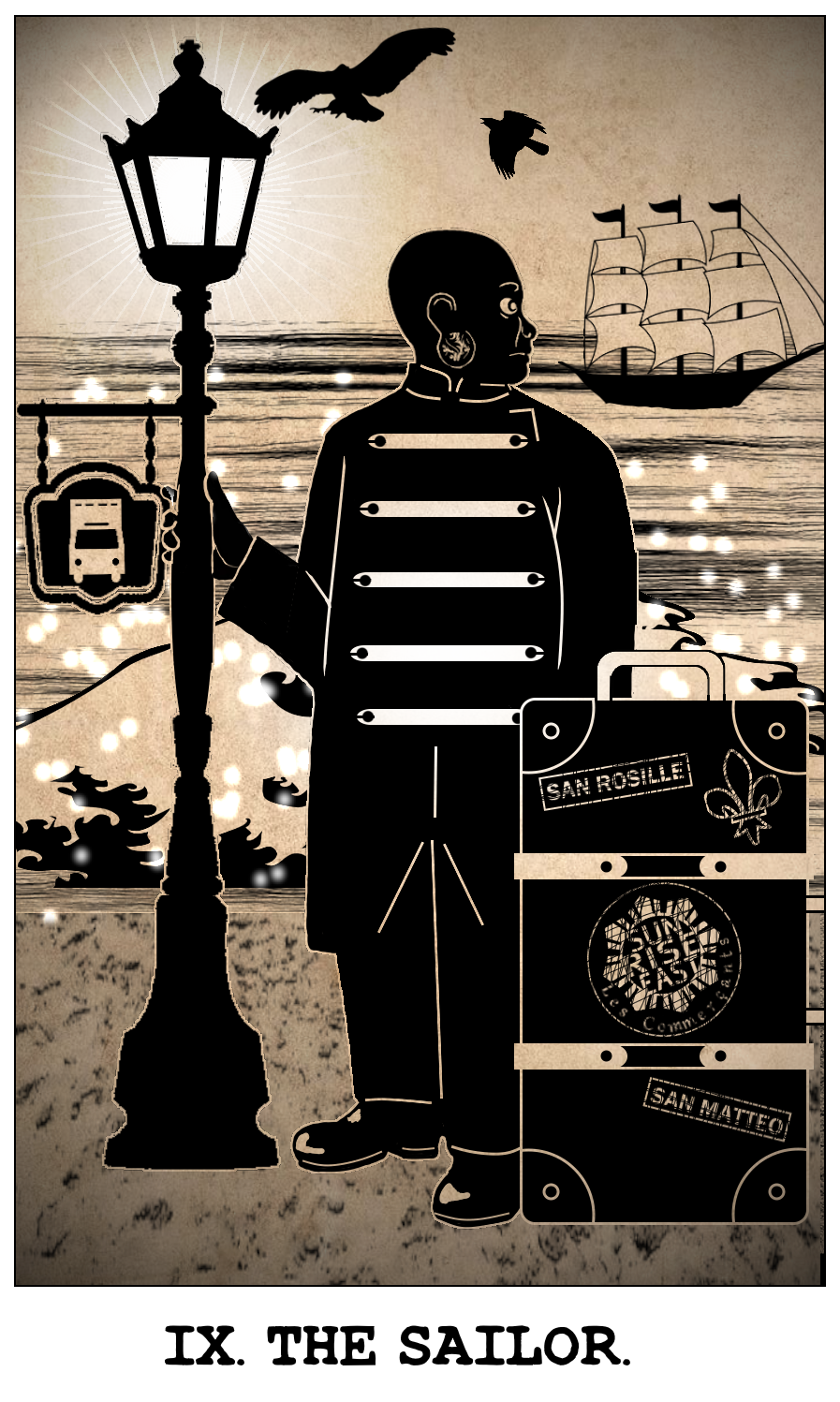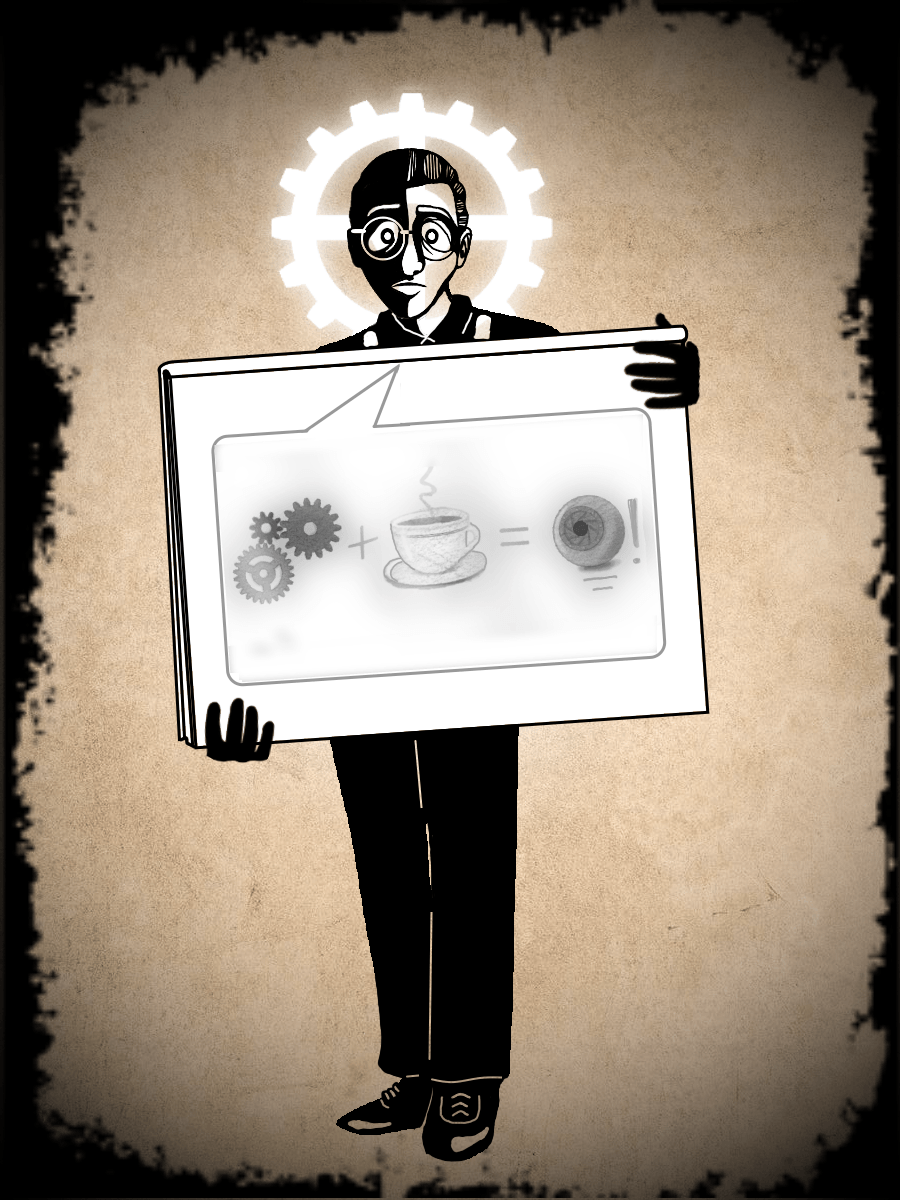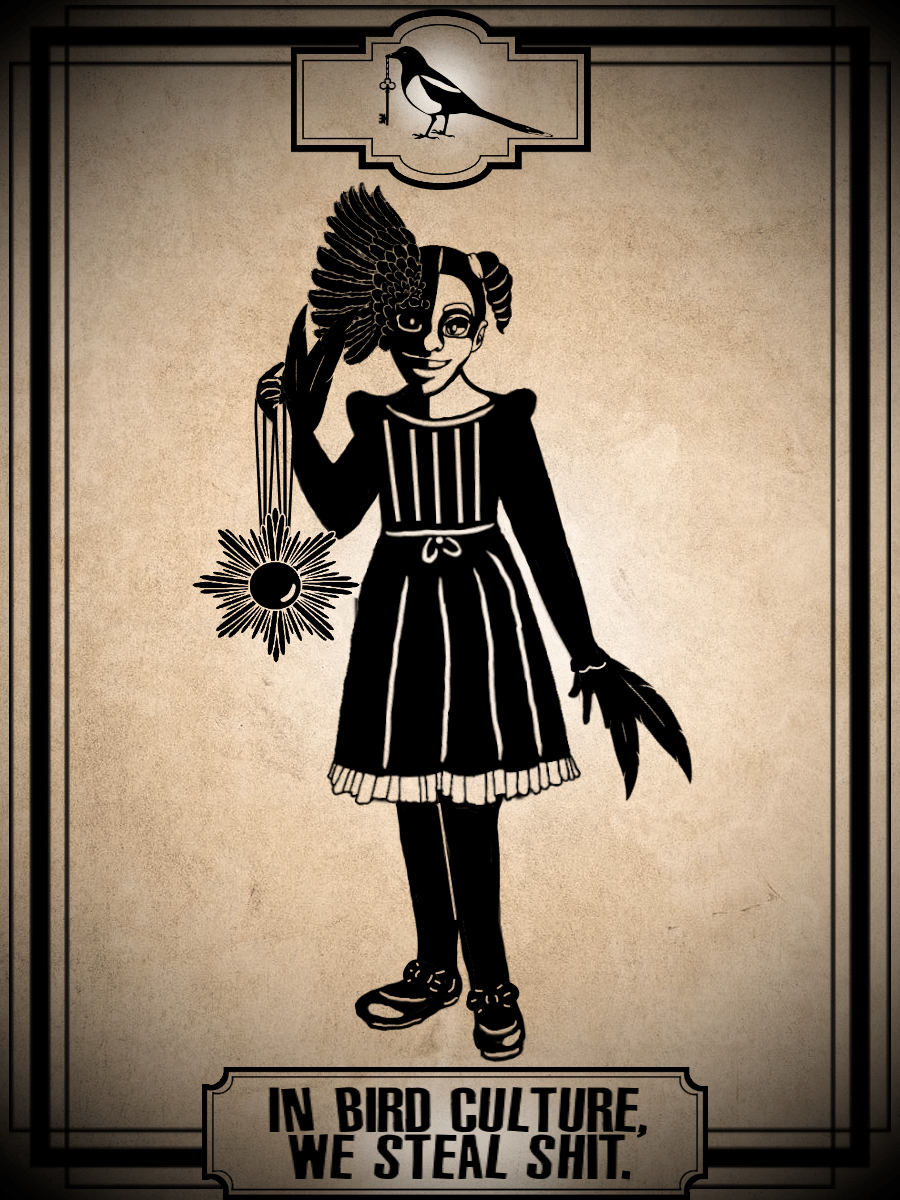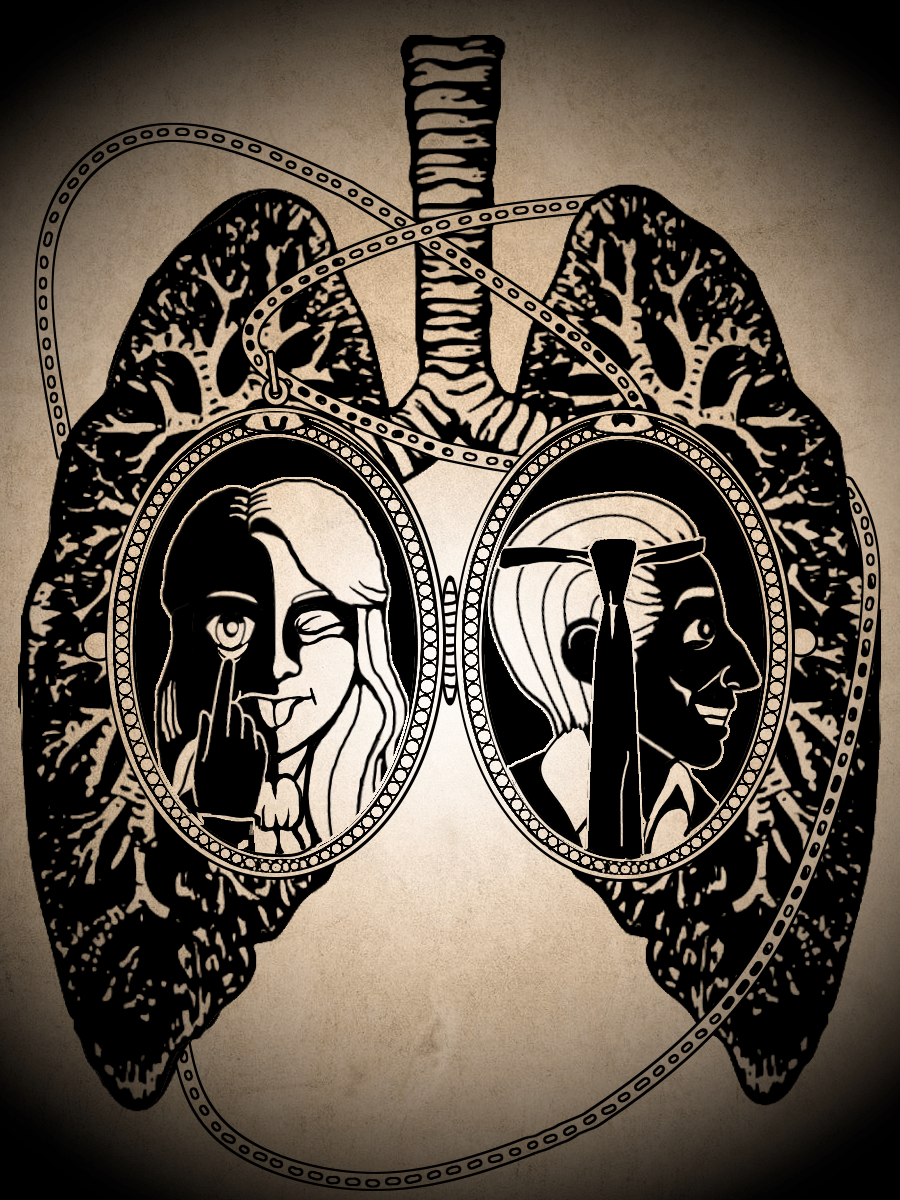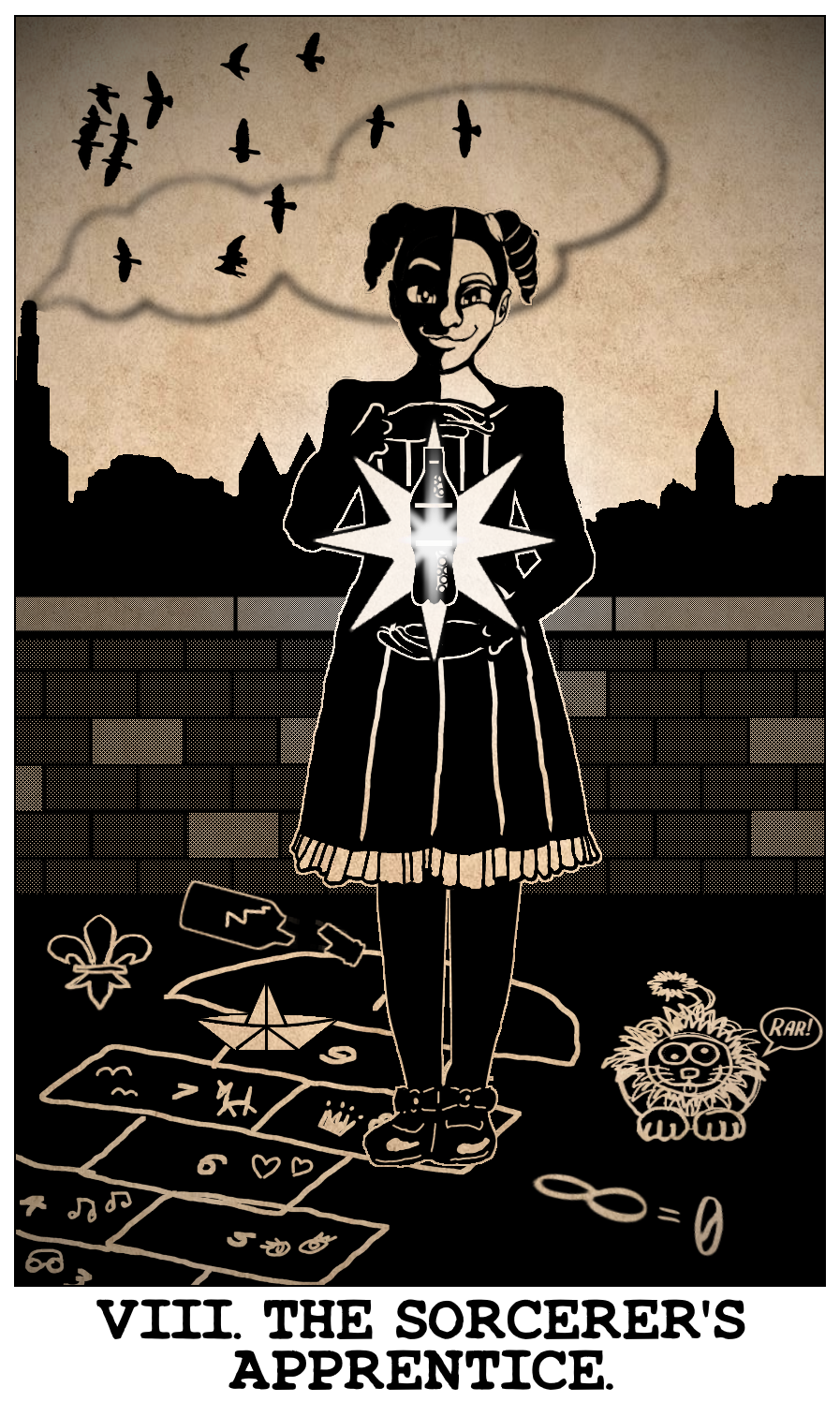They were on South Hollister, near an automat her mother was acquainted with. It was the first Frig’s Day of the month. Her mother had made another attempt to get a decent meal into Corinne Santee. It did not go well.
Having paid for the broken dishes and other damage, the General had closed herself in the nearest pay toilet to attempt an emergency repair on her uniform. There had been sugar and cream in the coffee, which complicated matters. Maggie saw an occasional thread of orange light under the metal door, evidence of deconstructive magic being skilfully applied.
Nevertheless, she feared that Corinne had accomplished what seventeen years of service and five of retirement had failed to do, and slain the uniform. Maggie would not particularly mind there not being a uniform, it was just the associated fallout that worried her. She was engaged in an internal philosophical debate that had nothing to do with the ship of Theseus.
If she has to replace the blouse and the blazer, is it still the uniform? What about the greatcoat? What if she can’t get the stains out of the greatcoat, even with dye?
She guessed optical magic was an option, but that might be even worse than replacing the blazer. That was literally fooling the eye. You could have any kind of uniform you wanted with that. Or be an entirely different person. At least from certain angles.
There had been stains before, people sure did like to throw things at General Glorious D’Iver, but it was usually the greatcoat that absorbed the damage. She had been in the process of unbuttoning it to sit down when Corinne suddenly decided that she did not want to have any lunch after all.
Maggie didn’t have a watch, but it seemed like she had been waiting a really long time.
She tapped on the door with one knuckle. “Uh, Mom? You okay in there?”
A sigh was audible. “I believe that the coffee was adulterated with a non-dairy creamer, which may have included a chemical or magical component. One pays a price for assuming, even the obvious.”
“Are you decent?” Maggie asked her.
“That is and always has been a matter of opinion,” came the reply. Nevertheless, she opened the door.
The buttoned greatcoat, which was pretty much all Maggie could see, was spattered with pale stains, as if Corinne had thrown bleach. That might’ve been salvageable, but the stains were shot through with fine holes, like a cheesecloth. There were similar holes in her mother’s white gloves. With such disarray beneath, the feathered hat looked even more mental than usual. Also, the rosette was dangling by three-inch-long thread, like a Yule ornament.
I am not going to laugh, Maggie thought, freezing her expression as if by complicated magic. I am not going to laugh. I am not going to laugh…
The General had also missed a coffee smudge on the side of her nose.
I am not laughing. No, no, no. Not me.
Maggie covered her mouth with both hands and tried to make it look like concern. She cleared her throat. “Ah…”
“I am aware of how it looks, Magnificent,” the General said. She sighed again and plucked the rosette from her hat like a silk apple. “Get it out of your system.”
Maggie exploded like an overheated boiler, “Pah-ha! Ah-ha-ha…”
“I have no one to blame but myself,” the General said firmly. She held out some small hope that she might be able to do something to shore up the fabric, but even with the blue dye she kept at home, it might end up looking like a hobo’s suit with patches. She wasn’t certain if continuing to wear it that way would be a reasonable penance, or if it would be better to…
Well, there was no guarantee that she would need to get rid of the uniform, it was pointless to think of that now.
She supposed if anyone was going to demote her, Corinne had that right.
“Are you quite through, Magnificent?”
“You have coffee on your nose, Mom,” Maggie said, wiping her eyes.
The General drew out a white handkerchief, similarly bespeckled with holes, and dabbed her nose.
Any further hilarity was cut short by a feminine shriek, “Let me back in, you bitch!”
Both Maggie and the General instinctively arrowed in on the sound. It was across the street and half a block down, in front of a fashionable brownstone building. A ring of spectators had gathered.
“Mom, is it Corinne?” said Maggie.
The General was already fording her way across the street, with a polite hand held up against the traffic. She would not hesitate to unload some magic on any cars or horses who were too impertinent to take the hint.
Maggie ran after her, without a regard for the occasional screech of brakes. There was other screeching to be concerned with. Oh, gods, she hoped they didn’t have to bust Corinne out of jail. Her mom and Hyacinth had tried to do that for Mordecai one time and it had taken all day…
“My canvases! Let me go back for my canvases!”
Maggie was not aware that Corinne ever had anything to do with canvases, but Corinne did not always make a whole lot of sense, so this still did not entirely rule her out.
The General parted the crowd as easily as she had parted traffic. Maggie travelled in her wake. She was in the habit of doing that in bird form to reduce drag and it worked about the same on foot.
In the centre of the crowd, with a ring of space around her begat by the hysterics, a young woman in an oversized green sweater with threadbare holes — and a pair of trousers! — was screaming at an older, more respectable lady in a flowered dress who was holding a key
Strewn on the ground around them was evidence of an eviction in progress: a suitcase that was closed but leaking indeterminate clothing out of the cracks, a cardboard box with art supplies in it (some of these had been scattered and were staining the sidewalk), and a scuffed blue Bakelite case that was nearly cubical in composition. The remnants of a decal were still legible beneath the latch: MelodieFare with musical notes, indicating a record player.
“I want my canvases!” the young woman howled. She lowered her head and attempted to tackle the woman in the flowered dress. A few laughing young men in the crowd easily prevented this.
The woman was small and of positively elfin proportions. The size of the sweater exaggerated this. She also had freckles. If not for the strong language and the fact that this was obviously a housing dispute, the General would have pegged her at about thirteen years old and a late bloomer at that.
We do not assume, General D’Iver reminded herself, still feeling the holes in her uniform. The blouse beneath was even worse.
“Let me go!” The young woman struggled with her arms crooked to either side of her, as if trapped in one of those ridiculous chest-exercisers at a gymnasium.
The men released her — fortunately, because the General was close enough and inclined to intervene on her behalf. The woman shot forward and tripped over her own suitcase, landing on her hands and knees.
Maggie skidded to the ground beside her. The cobbles were rough and uneven. “Are you okay?”
“My canvases…” the woman said, peering through stringy, sweat-soaked black hair. She was weeping. One of her palms was scraped raw.
“You have had ample time to pack, Miss Ottis,” said the landlady. “And more than ample warning, if I may say so. You are aware of my policies.”
“I can’t pack my canvases,” the young woman said thickly. “They don’t fold.”
“It is not unreasonable to allow this woman to collect her canvases,” the General said, stepping forward. She was, admittedly, not much taller than the dark-haired young woman, but a great deal more self-possessed.
“This piece of gutter trash no longer lives in my building,” said the landlady. She brandished the key. “I run a respectable establishment. My property extends three feet in either direction along the sidewalk.” She leaned down and addressed the dark-haired young woman, “Get off of it or I will call the police to report a vagrant.”
The General bent one knee and put a hand on the young woman’s shoulder. “Do your living quarters have a window, Miss… Ottis, is it?”
“Calliope,” the young woman said. “Calliope Marshmallow Otis. O-T-I-S, not O-T-T-I-S,” but she pronounced it with a short O, like “obstinate.”
“Marshmallow?” Maggie said.
“That’s my middle name,” Calliope said. “Mom and Dad said I got to pick.”
“Oh,” said Maggie. Though, really, that only raised further questions.
“Do you have a window, Miss Otis?” the General said.
“Not anymore,” Calliope said with a sob.
“Which window used to be your window, Calliope?” Maggie asked.
“That one.” She pointed.
“Third storey at the far right-hand side?” said the General.
“Yeah.”
“Would your canvases fit through it?”
“Yeah… I think you might have to turn the lobster one sideways.”
“That will not be an issue,” the General said. Neither was the quality of the paintings, which she was beginning to doubt. This was about justice.
“Don’t look, Miss Otis,” Maggie said. She put a hand over the woman’s eyes.
The General vanished in a flash of light.
Pandemonium beset the crowd, along with cries of pain and complaints of blindness and demands to know what was going on, as a large golden eagle winged its way up to the third storey. There was a lot of confused pointing.
Fastest eagle in the universe, Maggie thought, peering up at her. Chosen to protect mankind…
The eagle gave a furious shriek and the window exploded… mainly inward, but a few shards of glass sprayed onto the sidewalk and street, and into the crowd.
Poorly chosen, Maggie amended.
The landlady had caught a faceful of the light and reacted more to the sound of the explosion than the nature of it, with her hands still clapped over her face, “Somebody call the police!”
“Hurry up, Mom,” Maggie muttered.
Calliope turned and blinked at her. “Your mom’s a white lady?”
“Uh,” said Maggie. She was somewhat offended. A lot of people asked her that about her mom, but usually not after her mom had just turned into an eagle. She wasn’t quite sure how to react. “Yeah. My dad’s not.”
“Dads are not ladies,” Calliope said, frowning. She stared at the broken window, holding a hand above her eyes as a visor.
Maggie stared at her. “Yeeaah…”
The eagle had gone through the window. There was oohing and ahhing and a smattering of applause from the audience — the crowd — as a line of brightly painted canvases began to work its way out, as if suspended by wires.
It was possible, and Maggie hoped true, that no one was running off to call the police because they wanted to see what would happen next.
Each canvas turned as it exited, showing vibrant scenes that had been embellished with mirrors, scrap metal and various sculptures.
“Wow. An art show!” a nearby young man said. More people were coming over, which would provide excellent cover in the event of a police presence.
Psychological warfare, Maggie thought proudly.
“That one’s my muse,” Calliope said, indicating the second from the bottom.
It was a naked human figure done in silver and red, split by a smooth vertical line, one half male, one half female, and holding hands with itself, so that the conflicting palettes intertwined. The red half had an angel wing, the silver one was done up more like a demon, with a forked tail. Glittering pieces of glass and textured gouache abounded.
“Look at him go. I never thought about making him fly. I should’ve asked Chris to do that.”
“How do you know it’s a boy?” Maggie asked.
“You can just tell,” Calliope said.
There were a couple of alien landscapes with cactus and reaching bare trees in psychedelic colours, an ordinary café scene where the diners did not appear to be particularly concerned that a large green dinosaur was eating some of them, a peaceful log cabin with tentacles coming out of the lake, and a few collages of random images which were otherwise indescribable, although Calliope seemed to think otherwise.
“That’s Mille Fleur Road,” she noted, indicating one which had, among other things, a ladies’ shoe and a gold brooch glued to it. There was some applause from the audience, which was young and cool enough to understand, or at least wanted to appear that it did.
The last and largest picture included a giant lobster presiding over a bonfire, with shadowed figures dancing around it. It did, indeed, need to be turned sideways and fit through the window on the diagonal. There was another flash of light, somewhat muted by the distance.
“Is that all of them, Miss Otis?” a voice called down. All the paintings were lined up at eye-height in front of the building and free for examination.
Calliope cupped both hands around her mouth and called back, “Yes, thank you!”
The General, back in human form, descended from the third floor as if an invisible staircase were supporting her. This also engendered applause.
A gentleman with a goatee and his girlfriend with immaculate purple hair tapped Calliope on the shoulder and presented themselves. “I’ll give you fifteen sinqs for the hermaphrodite.” He indicated Calliope’s muse.
Calliope frowned. “Twenty.”
“Seventeen.”
“Eighteen-fifty, cash and carry,” Calliope said.
The trendy couple conferred.
Calliope stuffed eighteen fifty into her front pants pocket, the slight of which caused about fifty-percent laughter and fifty-percent calumny, and took hold of the painting. “Would you land Jeffrey, please, Miss… I’m sorry, what’s your name?”
“You know, he doesn’t look like a Jeffrey,” Maggie opined to herself.
“General Glorious D’Iver,” the General said. She landed the painting, just the one, which required some skill.
“That is a hell of a name to saddle a kid with,” Calliope said. She smiled. “But I guess I haven’t got any room to judge. Do people call you Gen?”
Maggie snorted and covered her mouth.
“People do not,” said the General, coldly. “I am a General.”
Calliope was explaining Jeffrey to the couple. “Here. There’s a sacrifice circle on the back. If you kill something, his eyes light up. Gets a laugh at parties. So what’s your name, then?” she asked the General.
“It is Glorious,” the General replied, blinking. She had apparently, for the first time in her life, forgotten about the D’Iver part.
“‘Who’s on first?’” Calliope replied, grinning. “Nah, I won’t tease you. I guess you get that a lot, huh, Glorie?”
“I have never before gotten that in my entire life,” said the General. She was also having a great deal of difficulty understanding it. This resulted in her neglecting to challenge the pejorative “Glorie,” a fatal error.
Calliope extended her hand. “Thanks for saving my paintings.”
The General shook it once firmly. “You’ve just sold one,” she noted. Perhaps the attachment had been financial as opposed to sentimental. The General approved of this.
“Yeah.” Calliope laughed. “This is great advertising, too bad no one’ll know where to find me.”
“Do you have a place to stay tonight?” the General asked her.
Maggie picked up the box of art supplies and handed it to her mother, then she collected the Bakelite case. “Let’s go there now, please.” Now that the show appeared to be over, people were increasingly liable to bring in the law enforcement, if only for the entertainment value.
Calliope shook her head. She knelt down, which was difficult in the crowd, and examined the ground. Her loose paint tubes had been trampled into oblivion, as well as a box of coloured pencils. There was no point trying to collect them. “I need a job to get a room,” she said softly, “and I don’t have one of those since this morning.”
“What did you do?” said Maggie. It had to be pretty impressive to get fired and evicted all in one day! She wondered why it wasn’t in the newspapers.
Calliope lifted her green sweater, exposing a white men’s shirt which was also too large for her, but a fair bit tighter in the abdominal area. She touched her round belly with one hand and lifted it, “This. I just couldn’t hide it anymore.”
“Where is your husband?” the General demanded. As soon as she got directions, there was going to be violence. Once again in the name of justice, of course.
“Haven’t got one,” Calliope said.
“Oh, yeah, that’ll do it,” said Maggie, wincing.
She wasn’t sure how she felt about it herself (Irresponsible, was the first thing that came to mind), but for most people, pregnant and unmarried was a deal-breaker. There were shelters and workhouses for that kind of thing, because landlords and employers and even families didn’t want anything to do with it.
Maggie thought the Joshua-people had a rule about hating the sin and not the sinner, and that was the reason they were willing to offer housing, but there was still hatred involved. Even St. Dennis’s painted nuns used contraceptives.
“My parents are in Ansalem,” Calliope said. She still hadn’t gotten up, for obvious reasons. The General offered a stable arm. Calliope rose heavily and laid a hand on her pants pocket. “I guess I could get on the train. I don’t know how I’ll manage the canvases. I’d have to buy ’em tickets…”
“I think six hours on a train would be deleterious to your health at this juncture,” the General said. As would, in her discreet opinion, arriving in Ansalem to potentially be rejected and left homeless again. “I know of a place where you can stay, for as long as you need — if you don’t mind being short of some modern conveniences.”
“No hot water?” Calliope guessed. “Seems like noplace has hot water anymore…”
“There is definitely not any hot water,” the General said. “Nor any plumbing whatsoever.” She tucked the cardboard box under her arm and collected Calliope’s suitcase as well. It was only coincidental that this occurred just after the sound of a police whistle.
Justice aside, the General did not wish to subject a young pregnant lady to a “twenty-four-hour hold while we wait for a judge” merely because she had reclaimed her own belongings. Nevermind how it had been accomplished.
“Is it, like, one of those hobo camps?” Calliope asked — with evident excitement.
“In many ways, yes,” the General said wearily. “If you would be so kind as to accompany me to the nearest bus stop, I will explain along the way.”
The fact that they were being followed by seven flying paintings somewhat dented their surreptitious departure, but there was quite a large crowd gathered, which interfered nicely with line-of-sight and access.
They kept walking until they found a stop with a bench and some shade for Calliope, which was — again, coincidentally — two blocks away from the disturbance and the police presence.
The paintings were still floating after them, but their number had been reduced to five. A café had been inexplicably interested in the weird landscapes. Calliope offered to throw in the one with the dinosaur, but this had been refused. There had also been an offer on the one with the lobster, but that one wasn’t for sale.
“Are they… worshipping it?” the General had asked, for lack of a more coherent comment on the incoherent scene. The dancing figures were vague shapes sketched in reds and browns, like a cave painting. The lobster appeared to be made of polyresin, like you might see in a window display.
Calliope nodded. “I think the gods are very much like a giant lobster, don’t you?” she said, and that had put an end to the General’s brief foray into art criticism.
Calliope sat on the bench with evident relief and put her bare feet on top of her slip-on shoes. “My feet belong to the baby,” she said. While they were still digesting this (the General figured it out after a moment, but Maggie was lacking context), she reached for the suitcase, “You mind?”
The General deposited it on the bench for her and Calliope opened it. It appeared stuffed with clothing.
She was making a deposit, not a withdrawal. She pulled off the green sweater and shoved it in. The suitcase closed easily, despite the bulky addition. She combed her fingers through her damp hair and sighed. “Hot today.”
She was wearing a white button-down men’s shirt, which they had known about, and also a pair of black suspenders, the kind with the metal clips. There was a suspicious familiarity to this outfit.
“Why…?” Maggie said.
Calliope slid her thumbs under her suspenders, “Easier than a belt.” She smiled.
“Have you given any thought to a dress?” the General asked, somewhat exasperated. She had attributed all the staring and catcalls to the lady in pants.
“They didn’t fit anymore,” Calliope said logically.
This was so incompetent on so many levels that the General was reduced to, “Um.” Her deeply ingrained politeness would not allow her to call a helpless young woman an idiot, even if she was acting like one.
“Cin’s probably going to take those from you,” Maggie said, indicating the clips. “It’s the metal. She takes everything metal. She uses it to fix people. You’ll have to get the kind with the buttons…” She trailed off. Milo wore the kind with the buttons.
A huge, black, and obvious double-decker bus blew past them without even slowing.
The General narrowed her eyes at the retreating end of it. There was an ad for Rinswell Soap Flakes. “Perhaps it was full.”
“Mom, you gotta land the paintings,” Maggie said.
“Magnificent, that is pointless,” the General said. “I will only have to pick them up again.”
Calliope raised no objection to the flying paintings or the bus. “I like ‘Magnificent.’ What’d you pick for your middle name?”
“Um, it’s Ameenah, but I didn’t pick it. It’s my dad’s mom, because my mom didn’t want his name.”
“I have a name,” the General said, frowning.
“Why’d you pick Marshmallow?” Maggie asked.
Calliope shrugged. “I liked marshmallows. I was five. I guess I still like them a little. Now my brother Euterpe, he’s weird, he picked Circus Peanut. I don’t know if he still likes those…”
“Your brother’s name is Euterpe?” Maggie said.
“Euterpe Circus Peanut Otis,” Calliope said, nodding. “Mom and Dad kinda had a thing for antiquity. My Dad teaches classical history. Italica and Thessalonia. When Cousin Violet told them nine kids, they decided they’d name us after the muses. The real ones, not Jeffrey. There was this king who was supposed to have done that, but the gods got angry and turned all the kids into magpies…”
“Magpies,” the General said tightly.
Calliope laughed. “Yeah, but I guess Mom and Dad wouldn’t have minded too much if that did happen. They were pretty cool. Still are, just in a different house. Of course, my brothers Erato and Melpomene don’t like having girl names, but Euterpe doesn’t care. Did I mention he’s weird?”
“I don’t think you need to,” Maggie said, grinning. It’s fate! she thought. This person is gonna live with us forever! “You really don’t mind about no electric and no plumbing and no metal, Miss Otis?”
Calliope shrugged and smiled. “I guess I dunno yet, but I don’t mind the idea of it, especially if this Hyacinth doesn’t mind about no job.”
“She does not mind about practically anything,” the General replied. “I should also mention we have had a large hole in the roof for approximately seven years with no hope of repair.”
“Wow,” said Calliope. “Does the rain get in?”
“Not usually,” the General admitted.
“Cool.”
The next bus, five minutes later, also blew past them.
“Mom, seriously, the paintings…”
“Are you suggesting the buses are not stopping on purpose?” the General said.
“Yes!” said apparently the only person with a tenuous connection to reality.
The General planted a hand on each thigh and stood. “I shall go to the police.”
“Mom, I think the police are gonna be a little unhappy about the flying paintings too. And the broken window,” Maggie added through clenched teeth.
The General did not go to the police. She did, however, stand by the curb with her arms folded.
The next bus stopped. Entirely.
The General walked up to the door and tapped on the glass. “Let us on.”
“What have you done to my bus?” shrieked the driver, muffled. He looked like a panicky fish in an aquarium.
“This is my bus,” the General replied.
Maggie picked up the cardboard box. “Come on, Calliope. We’re either getting on this bus or going to jail. Let’s get ready.”
“Three hots and a cot,” Calliope said placidly.
The General managed to talk them onto the bus. The driver seemed a bit confused as to why she wanted to pay for it, but he accepted the coins. They rode up top, due to the paintings.
It was fair and hot, though not as miserable as late summer away from the coast. Once the bus was released from bondage, there was a pleasant breeze.
Calliope was the only one of them with hair to speak of, at shoulder-length. The General kept hers brutally short and Maggie’s was bound in tight pigtails that acted about the same. Calliope grew rapidly tired of being whipped in the face, put a hand in her shirt pocket and drew out an elastic. She tossed her fingers through her hair again and tied it back.
Maggie and the General were now sitting on a bus next to a person in dark trousers, a white shirt and suspenders, with tied-back hair. This was not so impressive as to be worth remarking on, but it was a little disorienting that this person was talking to them. Also, pregnant.
“Yeah, I guess it’s about seven months,” Calliope said, examining her stomach. She’d offered to let Maggie feel the baby kick. “It must’ve been Chris.”
“If you don’t mind my asking, was this pregnancy planned?” the General said, as delicately as she was able. She suspected further idiocy, but was not quite willing to condemn it as such.
“Nah. We were doing that thing with the calendar.”
“How does a calendar do anything?” Maggie asked.
“It is called the rhythm method,” the General said. “But it does not, strictly, do anything. Do you have a religious objection to contraceptive charms, Miss Otis?” This would, of course, be stupid — there were so many gods and they were so badly disorganized, you might as well try to please a roomful of cats — but at least it was popular stupidity.
“Those don’t really work, do they?” Calliope said.
“They have always worked perfectly well for me,” the General said. She had heard this particular falsehood a few times and also suspected religion, or religious people, were at the root of it. “Did this ‘Chris’ offer to make a so-called honest woman of you?”
“I didn’t want to marry him or anything,” Calliope said. “I liked him okay, but not for the rest of my life. We talked about it and we both felt like that, so we kinda split up.”
“You would have been perfectly within your right to do so whether he felt that way or not.”
Maggie recognized her mother’s instruction voice, which was suited to teaching people or ordering them around.
“Yeah, I know,” Calliope said, earning a surprising feeling of respect from both Maggie and her mother. “But I didn’t have to. Chris is an okay guy. I mean, I wouldn’t have been with him in the first place otherwise.”
“You would be amazed at how many couples experience difficulty with that concept,” said the General. “I frequently am.”
The General had seen a lot of truly toxic relationships in her time, some of which had even curdled into marriages, apparently just because it was easier to stay together than break apart. She suspected widespread self-esteem issues in the population.
“It was your decision to keep the child, then?” she asked.
Calliope shrugged. “Yeah. I mean, I did like him.” She frowned. “People keep telling me that’s a stupid reason.” And she was hoping not to hear it again.
“The only stupid reason is one that is imposed,” the General said. “It is your body and it will be your child, you do not have to justify either of them.”
The General had gotten quite sick of people attempting to “speak reasonably” with her about her own pregnancy, and its attendant limitations for nine months out of a war, when really the only thing that mattered was because I say so. The Empire had no jurisdiction over whether or not she could turn into an eagle, especially when she was perfectly capable of performing her duties otherwise. It certainly was not going to deny her a child.
“I like you, Glorie,” Calliope said, smiling.
“I find I approve of some of your decisions,” the General replied. “But I believe you require education on the matter of contraceptive charms. Perhaps I can find you a pamphlet somewhere.” Ideally something with pictures, as she had vague doubts about this woman’s reading comprehension. “Have you been seeing a doctor, Calliope?”
“On and off. I’ve been having to sneak it.” She couldn’t see anyone associated with her job, nor could she be honest with her landlady about where she was going. Also, it was a little difficult finding a personal physician who wasn’t going to moralize at her. A couple of them had recommended those shelters where the nuns get to keep the baby.
Calliope Marshmallow Otis was getting very good at telling men in white coats to fuck off. She was thinking about taking it up as a hobby.
“I think I would like Hyacinth to have a look at you when we get home,” said the General. “She was only a medic, but a competent one. How is your hand?”
Calliope considered the scrape. “Not bad. Stings a little. What’d you do to it?”
The General waved dismissively. “Merely some battlefield magic. My specialization tends more towards causing injury than treating it. Still, one picks up a few things.” Provided one read books and asked intelligent questions.
“I guess this has been kinda like a war,” Calliope said, once again noting her belly. At the very least, she felt like a double agent behind enemy lines.
“We shall regroup and continue the fight,” the General said.
The bus ride home went faster than usual. The driver did not appear to be making all of his stops. Not that a whole lot of people would have been eager to board a bus with magicked paintings hovering over the top deck — though a lot of them pointed and some of them screamed.
Calliope did not comment on the attention, the derelict neighbourhood or even the composition of the house… not until they got right up next to it and the General removed the plywood board that served them as a gate.
“Is it an installation?” Calliope asked them, smiling.
“…I must admit, I am uncertain what you mean by the word,” the General said.
“An art installation,” Calliope said. She gestured to the paintwork. “Chris did a whole building one time, an abandoned one from the war. There was furniture climbing all over the walls and jumping out the windows. I like this one better, though. It’s subtle.”
“Subtle?” Maggie said. She had put significant effort into making her puzzle piece additions as loud and vibrant as possible!
“Yeah. It looks like people could really live there. It’s totally surreal.”
“People do live there,” the General managed at last.
Calliope smiled. “Awesomesauce.”
They mounted the porch steps and the General knocked on the door. “We have company,” she informed Magnificent’s exasperated expression. “It is polite.”
When Hyacinth’s irritated voice answered, the General merely knocked again and waited.
Calliope noted the sign. It was the first thing that gave her even a moment’s pause.
She removed her reading glasses from her shirt pocket, just to be sure. They were round and rimless. The half-circle ones were annoying when she was trying to do a big canvas. If her model or reference was at a distance, she simply pulled them down to the end of her nose. Her nose turned up at the tip and they rarely fell off.
No dogs, Calliope read, as an addendum to the main part about renting rooms. No real horses. No REAL horses.
“Is the concept of dogs allowed in the house?” Calliope asked them, as Maggie stared gape-mouthed and even the General staggered back a pace.
Hyacinth yanked open the front door and beheld Maggie and the General standing there with Milo in drag.
Okay, no. First of all, Milo was not in drag when he was dressed like that. Secondly, Milo was not a tiny pregnant lady with freckles.
“Hi,” said the tiny pregnant lady, lifting a hand.
“I, uh… I…” said Hyacinth.
“This is Calliope Otis,” the General said, perhaps just to assure herself. “She requires housing.”
“Why are there paintings?” Hyacinth managed.
Calliope peeked past the blonde lady with the frizzy ponytail to have a look at the inside of the house. A very tall person was coming down the big staircase, and there was a lot of cracked white tile, with black spaces showing between.
The tall person had dark red hair and a pale orange dress.
“Cin? Is there…?” Ann drew up short, put a hand over her mouth and stared. Oh, my gods, no, she thought. It’s that bucket woman all over again…
Calliope pulled off her glasses and tucked them back in her pocket. “So are you the one who wears dresses?” she asked suspiciously.
“I…” Ann said. “I… I am in a dress.”
“Yeah, but you’re not the coloured guy, and you’re not the crazy man from the attic. I was just curious. What’re those?”
“Florian de la Fontaine’s shoes,” Ann said numbly. She was speaking on autopilot. “There was an accident… during a magic storm…”
“I’m going to get them up one of these days,” Maggie put in.
“A good hobby sharpens the mind,” the General said, behind her. She also made an occasional attempt to remove the shoes from the floor, first because they annoyed her, but now it had become an intellectual challenge.
Calliope was standing in the centre of the front room and peering up at the hole in the roof, which every single one of Hyacinth’s prospective boarders did.
“A corrugated skylight,” she said. “Cool. Hey, so, about the C-O-N-C-E-P-T of D-O-G-S…”

